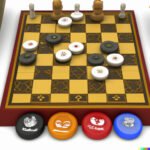Board games have been a staple of entertainment for centuries, providing a way for friends and families to come together and engage in friendly competition. Among the myriad of genres within the board game realm, strategy board games stand out as some of the most captivating and intellectually stimulating options.
Whether you are a seasoned strategist or new to the world of tabletop gaming, this article will delve into the top strategy board games of all time, showcasing the classics, modern marvels, cerebral challenges, epic battles, collaborative conquests, hidden gems, and the power of strategy.
Strategy board games have a rich history that dates back thousands of years. The origins can be traced to ancient civilizations like Egypt and Mesopotamia, where games like Senet and Royal Game of Ur were played.
These early examples laid the foundation for the evolution of strategy board games as we know them today. Over time, advancements in gaming mechanics and components gave rise to classic cornerstones such as Chess, Go, and Backgammon-timeless titles that have stood the test of time and continue to captivate players across generations.
As technology progresses, so too does the world of board gaming. Modern marvels in the form of innovative strategy board games have embraced digital enhancements to enhance gameplay experiences. With high-quality artwork, intricate game mechanics, and immersive themes, these games bring a fresh perspective to strategic thinking in the digital age. From engine building in Terraforming Mars to resource management in Agricola, these modern marvels push boundaries and challenge players’ tactical prowess.
Get ready to embark on an exciting journey through the world of strategy board games as we explore their different facets and uncover hidden gems along the way. Through this exploration, we aim to not only showcase some of the best strategy board games available but also highlight how playing them can improve critical thinking skills.
So gather your friends or family members around a table and prepare for countless hours full of strategic decision-making, fierce battles, and cooperative conquests. The world of strategy board games awaits.
The Birth of Strategy Board Games
Strategy board games have a long and rich history that dates back thousands of years. From ancient civilizations to modern-day societies, people have been captivated by the intellectual challenges and strategic thinking that these games offer. In this section, we will take a closer look at the origins of strategy board games and how they have evolved over time.
One of the earliest known strategy board games is Senet, which originated in ancient Egypt around 3100 BCE. Senet was a game of both luck and skill, involving the movement of pieces on a grid-like board. It was not only a form of entertainment but also played an important role in religious rituals and concepts of the afterlife.
Another notable historical strategy board game is Go, which originated in China over 2,500 years ago. Go is famous for its simplicity in rules yet infinite complexity in strategies. Played on a grid with black and white stones, players aim to control territory by surrounding their opponents’ pieces.
Over time, strategy board games spread to various parts of the world and took on different forms. Chess, for example, emerged in India during the Gupta Empire around the 6th century CE before spreading to Persia and Europe. Chess quickly became one of the most popular strategy board games worldwide, known for its deep strategic thinking and competitive nature.
These early strategy board games laid the foundation for countless others that would emerge throughout history. Today, we can still see their influence in modern-day classics such as Risk and Settlers of Catan. Whether they are inspired by ancient civilizations or driven by innovative ideas, strategy board games continue to captivate players young and old with their timeless appeal.
| Game | Origin | Date |
|---|---|---|
| Senet | Ancient Egypt | 3100 BCE |
| Go | Ancient China | Over 2,500 years ago |
| Chess | Ancient India – Gupta Empire | 6th century CE |
The Classic Cornerstones
Strategy board games have been enjoyed by players for centuries, and there are several classic cornerstones that have stood the test of time. These games have become iconic in the world of strategy gaming, often serving as the foundation for many modern titles. Let’s explore some of these timeless strategy board games.
Chess
Dating back to ancient India, chess is one of the oldest known strategy board games still played today. It is a game of skill and intelligence where two players go head-to-head on a checkered board with various pieces each having their own unique movements and abilities. Chess requires careful planning, critical thinking, and foresight to outmaneuver your opponent and ultimately capture their king.
Go
Originating in China over 2,500 years ago, Go is considered one of the most complex strategy board games ever created. Played on a grid board with white and black stones called “stones,” the objective of the game is to control as much territory as possible by strategically surrounding your opponent’s stones. Go requires deep concentration, spatial awareness, and long-term strategic planning.
Risk
Risk is a classic game of global domination that was first introduced in 1957. Players deploy armies across a map divided into territories with the ultimate goal of eliminating all other players from the game or achieving global domination by capturing all territories on the map. Risk combines elements of luck and strategy as players must carefully allocate resources while forming alliances and making tactical decisions to outwit their opponents.
These classic cornerstones continue to captivate players with their timeless gameplay mechanics and strategic depth. Whether you’re a novice or an experienced player, these games provide endless hours of intellectual challenge and entertainment while showcasing why they have remained popular throughout history.
Modern Marvels
In today’s digital age, the world of strategy board games has also adapted and evolved to incorporate innovative features and technologies. These modern marvels offer a unique and immersive gaming experience that combines the tactile pleasure of traditional board games with the convenience and capabilities of digital platforms.
One example of a modern marvel in the world of strategy board games is “Gloomhaven.” This game takes advantage of digital elements by utilizing an app that manages various aspects of gameplay, such as enemy behavior, events, and character progression. By automating these elements, it allows for a smoother gameplay experience and reduces the burden of bookkeeping.
Additionally, “Gloomhaven” incorporates a legacy-style element where the game evolves over time with new content unlocked as players progress through the campaign. This combination of innovative digital integration and engaging gameplay has made “Gloomhaven” one of the most popular strategy board games in recent years.
Another notable modern marvel is “7th Continent.” This game employs an innovative card-based exploration system that utilizes QR codes. Players use their decks of cards to explore a mysterious continent, scanning QR codes on various cards to reveal new locations or encounters. This unique merging of physical cards with digital technology creates an engaging and immersive experience for players. It also allows for endless replayability, as each playthrough can result in different outcomes based on player choices.
These examples serve as just a glimpse into the exciting world of modern strategy board games in the digital age. Whether it’s integrating apps for streamlined management or incorporating QR codes for interactive storytelling, these innovations bring new dimensions to traditional board game mechanics. With continued advancements in technology, we can expect even more awe-inspiring and inventive strategy board games in the future.
| Game | Innovative Features |
|---|---|
| Gloomhaven | Automated gameplay through an app, legacy-style element |
| 7th Continent | QR code-based exploration system, immersive and interactive storytelling |
Cerebral Challenges
Strategy board games are not just a source of entertainment; they also offer a mental workout that pushes players to their limits. In this section, we will explore some cerebral challenges that strategy board games provide. These games require players to think critically, strategize, and make strategic decisions to outwit their opponents.
One example of a cerebral challenge in the world of strategy board games is chess. With its deep-rooted history spanning centuries, chess is known as the ultimate test of strategic thinking and foresight. This game forces players to think several steps ahead, anticipating their opponent’s moves and adapting their own strategies accordingly. Chess not only enhances analytical skills but also teaches patience and discipline.
Another cerebral challenge comes in the form of Go, an ancient Chinese game that has been played for over 2,500 years. Go is deceptively simple yet incredibly complex, requiring players to place stones on a grid to control territory while simultaneously attacking and defending. The game presents infinite possibilities and demands exceptional spatial awareness and long-term planning skills.
For those looking for a more modern cerebral challenge, there are strategy board games like “Pandemic.” In this cooperative game, players work together as a team to prevent the outbreak of diseases across the globe. Each player takes on a specific role with unique abilities, forcing them to strategize collectively and make critical decisions under pressure.
Epic Battles
When it comes to strategy board games, few genres captivate players as much as those that revolve around warfare. These games offer the thrill of strategizing and outmaneuvering opponents in intense battles. Whether you’re a history buff or simply enjoy the thrill of conflict, there are several epic battle strategy board games that cater to all types of players.
One iconic game in this genre is Risk, which has been entertaining players for over 60 years. In Risk, players assume the role of generals vying for world domination through strategic planning and tactical maneuvers. The game offers endless possibilities and keeps players on their toes as they vie for control of territories and engage in fierce battles.
Another popular strategic board game focused on warfare is Axis & Allies. This World War II-themed game puts players in command of the major powers involved in the conflict. Players must allocate resources wisely, plan military strategies, and engage in combat to achieve victory. With its historical accuracy and depth of gameplay, Axis & Allies offers an immersive experience for strategy enthusiasts.
For those looking for a more futuristic take on epic battles, Twilight Imperium is the go-to choice. This sprawling space opera game sees players take on the roles of different intergalactic civilizations competing for dominance in a distant future. Twilight Imperium challenges players to manage resources, negotiate alliances, and wage wars across galaxies with its rich lore and intricate mechanics.
Whether you’re interested in historical warfare or exploring imaginative futuristic conflicts, epic battle strategy board games provide hours of engaging gameplay where each decision can change the tide of war. These games test your ability to think strategically under pressure while allowing you to immerse yourself in captivating themes and narratives. If you’re a fan of thrilling battles and commanding armies, these strategy board games are sure to keep you entertained for hours on end.
Collaborative Conquests
In the realm of strategy board games, there is a subset that emphasizes collaboration and teamwork. These cooperative strategy board games offer players the opportunity to work together towards a common goal, fostering communication, problem-solving, and teamwork skills. The experience of playing these games can be not only fun and engaging but also a great way to develop important skills for team building.
The Essence of Cooperation
Cooperative strategy board games differ from competitive ones in that all players work together as a team to achieve a shared objective. Rather than competing against each other, they must collaborate, share information, and make collective decisions in order to succeed. This aspect of cooperation makes these games unique and enhances the sense of camaraderie among players.
Examples of Cooperative Strategy Board Games
Popular examples of cooperative strategy board games include Pandemic, Forbidden Island, and Arkham Horror. In Pandemic, players take on different roles as members of a disease control team who must work together to prevent the spread of deadly diseases around the world.
Forbidden Island challenges players to retrieve archaeological treasures from an island sinking into the sea while combating rising water levels collaboratively. Arkham Horror immerses players in a cosmic horror setting where investigators must cooperatively solve mysteries and defeat ancient evils.
These games require effective communication, strategic planning, and coordination among team members. Each player must contribute their unique skills and abilities towards achieving the common objective. The success or failure rests on the shoulders of the entire team rather than individual performance alone.
The Benefits for Team Building
Playing cooperative strategy board games can have several benefits for team building purposes. First and foremost, these games promote effective communication within teams as players need to openly discuss strategies, share information, and coordinate their actions. They provide opportunities for teammates to practice active listening and express their thoughts and opinions in a constructive manner.
Furthermore, cooperative strategy board games require players to think collectively and consider the perspectives of others. This fosters empathy, understanding, and respect within the team, which are all crucial components of effective teamwork. It also encourages problem-solving skills as players work together to overcome challenges and obstacles presented by the game.
By playing these board games, teams can develop and strengthen their bonds, improve their ability to collaborate effectively, and enhance their problem-solving capabilities. These skills can then be translated into real-world work scenarios where cooperation and teamwork are essential for success.
Hidden Gems
When it comes to strategy board games, there are certain titles that dominate the conversation. However, there are plenty of hidden gems out there that may not receive as much recognition but are still worth exploring. These underrated strategy board games offer unique gameplay experiences and deserve a spot on any gamer’s shelf.
“Tigris & Euphrates”
One of the hidden gems in the world of strategy board games is “Tigris & Euphrates.” Designed by Reiner Knizia, this game takes place in ancient Mesopotamia where players compete to build civilizations along the Tigris and Euphrates rivers. The game’s mechanics revolve around tile placement, area control, and conflict resolution.
What sets “Tigris & Euphrates” apart is its emphasis on player interaction and dynamic strategies. It offers a challenging yet rewarding experience as players balance multiple resources and compete for dominance across different aspects of civilization-building. Despite being released in 1997, it remains overshadowed by more recent titles but continues to be highly regarded by strategy enthusiasts.
“Brass: Birmingham”
- “Brass: Birmingham” is another underrated gem that deserves more attention in the strategy board gaming community. A sequel to Martin Wallace’s original “Brass,” this game transports players into the heart of industrial revolution-era England. As industrialists, players must manage their networks of canals, railroads, and industries while keeping an eye on economic opportunities.
- What makes “Brass: Birmingham” stand out is its complex economic engine that rewards careful planning and investment decisions. The game offers a deep and immersive experience with strategic depth that keeps players engaged from start to finish. With its elegant design and thematic richness, it is no wonder it has garnered a strong following among those in the know.
“Dominion”
“Dominion” may not be as well-known as other strategy board games, but it has made a significant impact on the genre. Created by Donald X. Vaccarino, this deck-building game introduced a new gameplay mechanic that revolutionized the industry. In “Dominion,” players start with a small deck of cards and expand their repertoire throughout the game, strategically selecting cards to enhance their deck’s efficiency.
What sets “Dominion” apart is its limitless replayability and strategic depth. With numerous expansions available, each adding new cards and mechanics, players can constantly adapt their strategies and explore different combinations. Despite being overshadowed by more visually impressive titles, “Dominion” remains a beloved gem for strategy aficionados who appreciate its elegance and depth.
These hidden gems of strategy board gaming offer unique and captivating experiences that should not be overlooked. Whether you are a fan of ancient civilizations, industrial revolutions, or deck-building mechanics, there is an underrated strategy board game waiting to be discovered. So delve into these hidden gems and uncover the strategic treasures they hold.
The Power of Strategy
Playing strategy board games not only provides hours of entertainment and fun, but it also offers numerous benefits for players, particularly when it comes to improving critical thinking skills. Strategy board games require players to think strategically and plan ahead, which can enhance problem-solving abilities and decision-making skills.
One of the main ways that playing board games improves critical thinking is by requiring players to analyze different situations and come up with creative solutions. In strategy board games, players often encounter complex problems that require them to think critically and consider various possible outcomes before making a move. This process of analyzing options, evaluating consequences, and strategizing can help develop critical thinking skills that are applicable in other aspects of life.
Furthermore, playing strategy board games can enhance cognitive skills such as memory and concentration. Many strategy board games involve remembering rules, tactics, and previous moves made by opponents. Players need to pay attention to the gameboard and remember information throughout the game. This not only strengthens memory but also promotes focus and concentration.
Critical thinking is also improved through playing strategy board games because they foster logical reasoning. Players need to evaluate the best course of action based on available information and use logical reasoning skills to determine the most effective strategies. They must analyze patterns, anticipate opponents’ moves, weigh risks versus rewards, and adapt their plans accordingly. These processes all contribute to developing logical thinking abilities that are transferable to real-life situations.
Conclusion
Strategy board games have captivated players for centuries and continue to be a beloved pastime for people of all ages. From the classic cornerstones that have withstood the test of time to the innovative marvels of the digital age, strategy board games offer intellectual challenges, entertainment, and social interaction that few other activities can match. The enduring appeal of these games lies in their ability to push our limits, promote critical thinking, foster collaboration, and provide endless hours of fun.
Throughout history, strategy board games have proven themselves as timeless classics that are always in style. Games like Chess and Go have been played for centuries, captivating players with their intricate gameplay and strategic depth. These classic cornerstones showcase the essence of strategy board games, emphasizing the importance of planning ahead, anticipating your opponent’s moves, and making calculated decisions.
In recent years, strategy board games have also embraced technology and adapted to the digital age. The rise of modern marvels such as Settlers of Catan or Carcassonne has brought an innovative twist to traditional gameplay. These games utilize digital platforms to enhance player interaction, streamline game mechanics, and introduce new elements that keep players engaged.
Above all else, strategy board games challenge our minds and improve critical thinking skills. Players must analyze complex situations, evaluate risks versus rewards, and devise creative solutions to achieve victory. By engaging in strategic decision-making within a controlled environment, players can sharpen their problem-solving abilities and develop essential life skills.
Furthermore, strategy board games provide an opportunity for social interaction and team building. Collaborative conquests encourage players to work together towards a common goal while fostering cooperation and communication among teammates. These cooperative strategy board games not only strengthen relationships but also enhance leadership skills and promote effective teamwork.
Undeniably underrated yet worth checking out are hidden gems in the world of strategy board games. These lesser-known titles often offer unique gameplay mechanisms or narratives that set them apart from more mainstream options. Exploring the hidden gems can lead to delightful discoveries and provide a fresh perspective on the genre.
In conclusion, the appeal of strategy board games is everlasting for good reason. These games combine intellectual challenges, entertainment, social interaction, and personal growth into an enjoyable pastime. Whether you are a fan of classic cornerstones or prefer modern marvels, strategy board games have a way of capturing our imagination and bringing people together. So gather your friends and family, set up the game board, and let the strategizing begin.
Frequently Asked Questions
What is the most popular strategy board game of all time?
The most popular strategy board game of all time is arguably Chess. With origins dating back to the 6th century, Chess has stood the test of time and continues to be widely played across various cultures and countries.
Its simple yet intricate gameplay, which involves strategizing moves to outwit opponents and capture their king, has made it a staple in both casual and competitive gaming circles. Chess tournaments and championships attract players from around the world, further cementing its status as the go-to strategy board game.
What is the top 5 board games of all time?
Identifying the top five board games of all time is subjective as it depends on various factors such as cultural preferences and personal tastes. However, some consistently popular choices among board game enthusiasts include Monopoly, Scrabble, Clue (also known as Cluedo), Risk, and Settlers of Catan.
These games have been enjoyed by millions of people worldwide for decades, offering a mix of strategy, luck, negotiation, deduction, and social interaction that keeps players engaged.
What is the world’s biggest strategy game?
When it comes to the world’s biggest strategy game in terms of scale and player base, one significant contender is undoubtedly Sid Meier’s Civilization series. This long-running video game franchise allows players to build and develop entire civilizations from ancient times to future eras. With numerous iterations released since its debut in 1991, Civilization has amassed a massive following that appreciates its complex mechanics encompassing diplomacy, warfare, exploration, research, trade routes management, city planning, and more.
The games often span hundreds or thousands of simulated years and feature a vast number of playable civilizations from different historical periods. As a result of its expansive scope and strategic depth that spans ages of human history worldwide, Civilization remains an iconic strategy game loved by gamers globally.

I love playing all kinds of games – from classics like Monopoly to modern favourites like Ticket to Ride.
I created this blog as a way to share my love of board games with others, and provide information on the latest releases and news in the industry.





